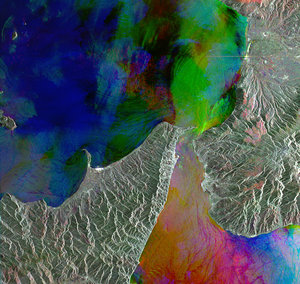ESA and the Commission kick off action plan for Global Monitoring for Environment and Security
ESA PR 14-2002. Antonio Rodotà, ESA's Director General and Philippe Busquin, Research Commissioner and responsible for space policy, today opened the first meeting of the GMES Steering Committee in Brussels.
This meeting brings together, for the first time, the users and suppliers of Global Monitoring for Environment and Security (GMES) services and technologies. The Steering Committee will assist in implementation of the joint ESA/EU action plan on GMES. The goal set by ESA and the European Union is to develop and bring into operational service by 2008 an autonomous European global monitoring capability for environmental and security purposes.
The GMES initiative aims to federate Europe's activities in satellite observation and remote sensing, in support of public policies. GMES targets improved use of Europe's existing and planned capabilities and infrastructures and development of mechanisms for collecting and distributing data in support of European policy goals in various fields, such as the environment, development cooperation, civil protection and the fight against fraud.

GMES features prominently in the Aeronautics and Space priority in the Community's Sixth Research framework programme (2002-2006). Applications include such activities as monitoring the global environment, detecting natural disasters, managing mass movements of refugees.
As Antonio Rodotà observed, "GMES has, along with Galileo, been identified as a priority area for cooperation between ESA and the EU; ESA will be working hand in hand with the Commission to draw up an action plan in this area, define services and products and build an appropriate European infrastructure".
The Steering Committee will be co-chaired by ESA and the European Commission, and will include representatives of the European Council Member States, the European Environment Agency, EUMETSAT and other key players in the areas of security and the environment.
GMES and Galileo are two pillars of Europe’s space policy, developed jointly by the European Commission and the European Space Agency. This meeting will be a further step in building that policy. It follows the successful launch on 1 March of ESA's ENVISAT (the largest Earth observation satellite ever built and a key contribution to GMES). It is also taking place just a few days before formal adoption of the Galileo space navigation programme by the EU Transport Ministers following the positive decision in Edinburgh by the Ministers responsible for space affairs.
Background

A key priority of the GMES initiative is to develop innovative, user-driven applications and services in the separate but complementary areas of global monitoring for environment and security. Combining space, land-based and airborne technologies, GMES will help develop innovative tools and applications to assist decision and policy makers at the European, national and even local levels.
Natural and man-made disasters take a staggering toll in economic and human terms:
- damage caused by floods in France in 1999: EUR 500 million
- average yearly costs from flooding in the USA: US$ 1.8 billion; from storms: US$ 1.8 billion
- cost of one single environmental disaster, the Amoco-Cadiz oil spill: EUR 9.3 billion
- cost in human life: 665 000 people killed over the last decade by natural disasters
GMES, a joint initiative of the European Commission and of the European Space Agency will play an important role in responding to such disasters. Combining data from ENVISAT and other terrestrial, aerial and seaborne observation systems, GMES will allow European researchers, private companies and public authorities to better monitor climate change, track environmental pollution, and react to emergencies; It will also make a major contribution in the areas of safety and security. In particular, it should help optimise maritime and other traffic, improve cross-border responses to catastrophic events, enable refugee movements to be monitored, and facilitate the distribution of food and medical aid.

At the global level, GMES will provide new verification tools to contribute to detailed monitoring of the implementation of international protocols, such as the Kyoto protocol on climate change, as well as security and international aid agreements. At the other end of the spectrum, GMES will help local authorities pinpoint problems (e.g. shoreline erosion) and improve their response to catastrophic events (floods, mudslides, avalanches, forest fires etc.). At European level, looking beyond environment and security, GMES will furnish new objective data to support a broad range of Community policies - notably regional development, transport, agriculture, enlargement, development and foreign policy. In all these areas, the 6th framework programme will bring players together, combine their needs and federate their efforts.
This ambitious programme is about consolidating Europe’s capabilities in a sector where it currently depends on data from other sources. Development of a GMES infrastructure built around a constellation of satellites is also a significant opportunity for the aerospace industry. At the meeting of ESA's Council at ministerial level in Edinburgh in November 2001, funding for the GMES programme was granted on the Agency side for the next 5 years.
GMES priorities and organisational aspects
Priorities in the GMES "initial period" will be to deliver pilot information products and services on key environment and security issues, to assess current capabilities, and to define a future systems infrastructure.
The GMES Steering Committee, established in Brussels on 19 March 2002 and made up of senior representatives of the different stakeholders, will drive the GMES initiative and assist in the implementation of the joint ESA/EU GMES action plan. Additionally, a high level GMES Forum will foster ongoing dialogue between all parties involved.






